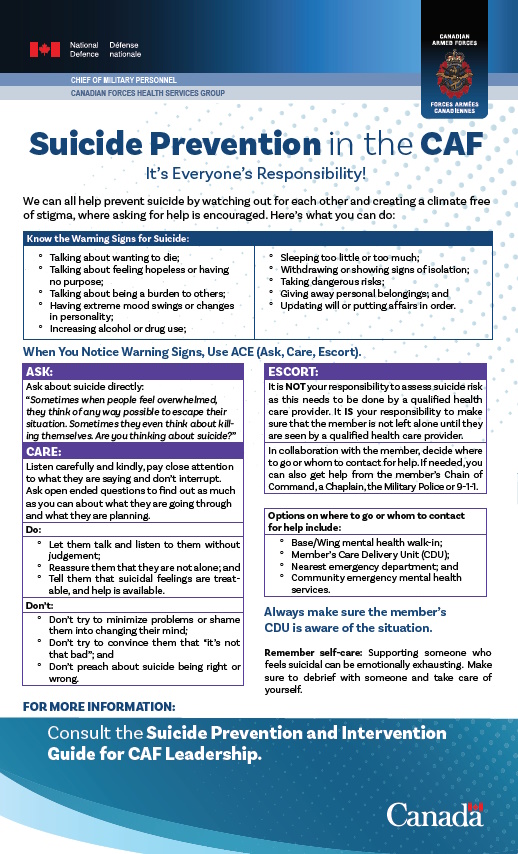Quick Reference Guide
Suicide Prevention in the CAF: It's Everyone's Responsibility
We can all help prevent suicide by watching out for each other and creating a climate free of stigma, where asking for help is encouraged. Here’s what you can do:
Know the Warning Signs for Suicide:
- Talking about wanting to die;
- Talking about feeling hopeless or having no purpose;
- Talking about being a burden to others;
- Having extreme mood swings or changes in personality;
- Increasing alcohol or drug use;
- Sleeping too little or too much;
- Withdrawing or showing signs of isolation;
- Taking dangerous risks;
- Giving away personal belongings; and
- Updating will or putting affairs in order.
When You Notice Warning Signs, Use ACE (Ask, Care, Escort).
ASK:
Ask about suicide directly:
“Sometimes when people feel overwhelmed, they think of any way possible to escape their situation. Sometimes they even think about killing themselves. Are you thinking about suicide?”
CARE:
Listen carefully and kindly, pay close attention to what they are saying and don’t interrupt. Ask open ended questions to find out as much as you can about what they are going through and what they are planning.
Do:
- Let them talk and listen to them without judgement;
- Reassure them that they are not alone; and
- Tell them that suicidal feelings are treatable, and help is available.
Don’t:
- Don’t try to minimize problems or shame them into changing their mind;
- Don’t try to convince them that “it’s not that bad”; and
- Don’t preach about suicide being right or wrong.
ESCORT:
It is NOT your responsibility to assess suicide risk as this needs to be done by a qualified health care provider. It IS your responsibility to make sure that the member is not left alone until they are seen by a qualified health care provider.
In collaboration with the member, decide where to go or whom to contact for help. If needed, you can also get help from the member’s Chain of Command, a Chaplain, the Military Police or 9-1-1.
Options on where to go or whom to contact for help include:
- Base/Wing mental health walk-in;
- Member’s Care Delivery Unit (CDU);
- Nearest emergency department; and
- Community emergency mental health services.
Always make sure the member’s CDU is aware of the situation.
Remember self-care: Supporting someone who feels suicidal can be emotionally exhausting. Make sure to debrief with someone and take care of yourself.
FOR MORE INFORMATION: Consult the Suicide Prevention and Intervention Guide for CAF Leadership.
